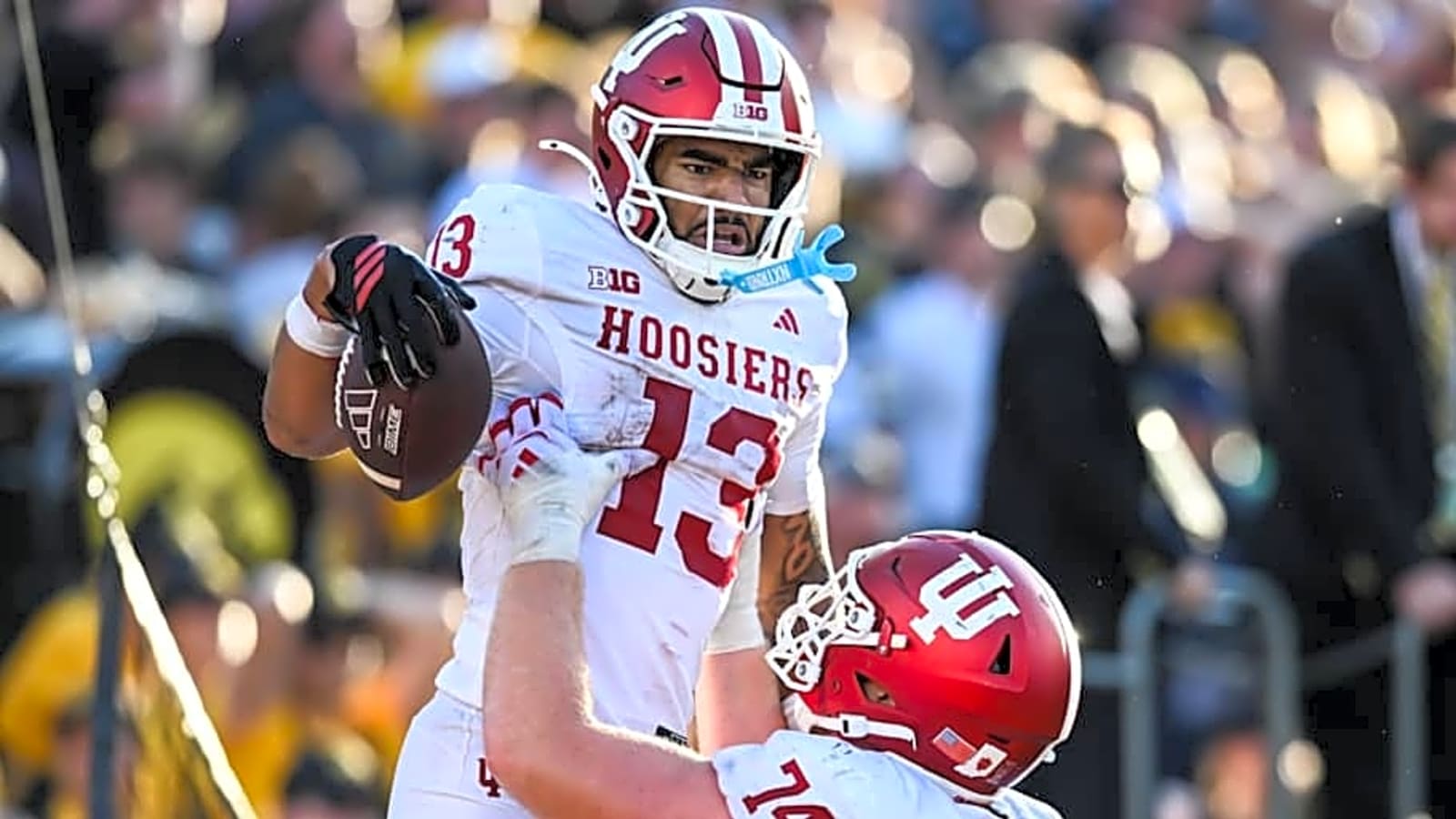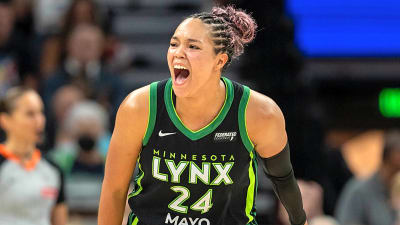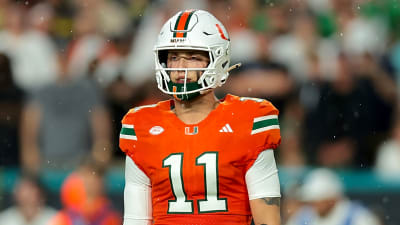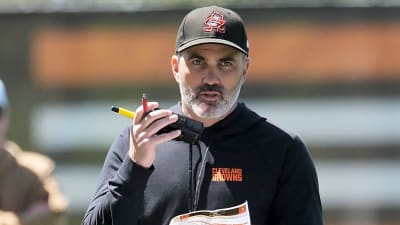
Eventually, Indiana football's 20-15 win over Iowa on Saturday at Kinnick Stadium will be compartmentalized into the same part of Curt Cignetti's mind as hundreds, if not thousands, of other games.
Cignetti insists he'll forget all of it — the frustration he felt with officials over missed calls or victory delay rules, the hard-fought gut check his team survived and the collective blend of good, bad and ugly left behind in Iowa City.
But the image of senior receiver Elijah Sarratt sprinting into Kinnick Stadium's South endzone for a go-ahead 49-yard touchdown on 3rd and 10 with less than 90 seconds remaining won't soon leave Cignetti.
"That's what I'll remember," Cignetti said.
At least in the immediate aftermath of the Hoosiers' dramatic victory, Cignetti remembered the play's minute details, too.
On second down, Iowa brought what Cignetti called a house blitz, which entails bringing one more defender than Indiana had blockers. Indiana quarterback Fernando Mendoza referred to it as a safari blitz. It's perhaps better known as cover zero, where there's no safety help in coverage. Every defender is either blitzing or playing man coverage.
The Hawkeyes found success with the blitz package the previous possession, as pressure forced Mendoza into an overthrow and his first interception of the season. Once it tasted success, Iowa went back to the blitz-filled well again, and again, and again.
"That entire drive, they're basically telling us, 'Hey, you're not going to be able to throw the ball on cover zero,'" Mendoza said. "So, when they have off coverage on both of our receivers, (Omar Cooper Jr.) and Elijah, it's kind of a dealer's choice. And especially with the matchup, we really like the matchup."
The Hoosiers made a schematic correction before the 3rd and 10 play, turning to a seven-man protection. Cignetti estimated Indiana had to use seven blockers anywhere from three to six times Saturday.
Aided by experience from their non-conference slate, the Hoosiers were comfortable using heavier protection. They faced house blitzes against Old Dominion in Week 1, a few times against Kennesaw State in Week 2 and heavily in the early stages against Indiana State in Week 3.
So, with the game on the line, Indiana kept tight end Holden Staes and running back Kaelon Black in the backfield for additional blocking help. It's not an aesthetically pleasing look, Cignetti said, but it's effective.
"Quarterback coaches and offensive coordinators, they hate seven-man slide protection, three-man routes, no running backs on check downs," Cignetti said. "It just doesn't look real pretty on the blackboard. You know what I'm saying? But when you get those kind of blitzes, that's what you've got to be in.
"It frees guys up to work one-on-one and gives you time to throw the football."
Indiana ran the same play against the same look in the first quarter, but Mendoza's pass to Sarratt fell incomplete. It was 3rd and 2, and Iowa cornerback Deshaun Lee, aligned in press coverage, stayed tight to Sarratt and broke up Mendoza's throw.
The Hoosiers went back to it in the fourth quarter. The game circumstances were different, but so was the down and distance. Iowa played off coverage, not press, on the all-important 3rd and 10.
Indiana knew it had the right play when Iowa's safeties crashed toward the line of scrimmage. Mendoza saw single coverage for Sarratt, who identified the blitz and ran a faster, flatter route.
Everything after the snap was merely high-level pitch-and-catch between a quarterback in the Heisman Trophy race and a receiver who earned preseason All-American honors.
"It was an easy throw," Mendoza said. "It'd be easy to just get the ball in Elijah's hands. And evidently, everybody saw what happens when you get the ball in Elijah's hands."
"I was just able to catch it and make a play," Sarratt added. "And (Mendoza) stood in there, got hit and made a perfect throw. And that's all you can ask for."
Upon completing the catch, Sarratt shrugged off Lee's tackle and won a 40-yard footrace against linebacker Jaxon Rexroth. Sarratt admitted he was ready to start yelling while he was running.
Instead, Sarratt kept his composure and saved his celebration for the endzone. Black was the first to greet him. Nearly 40 yards behind them, Mendoza brought his hands together, lifted his arms and raised his head toward the heavens.
As Kinnick Stadium fell quiet, Mendoza savored an intimate moment with a higher power.
"It was a big sense of relief," Mendoza said. "I didn't play my best game. But I mean, it was kind of like thanking God, just cause I always, before the game, I ask Jesus and God to play through me. And I think that was the moment that he came and basically helped me get back in the game, maintain good poise, to be able to deliver the ball to Elijah.
"And just so thankful and grateful for a resilient offense that, hey, no matter how the games going, we're gonna be a tough offense. Whether we're up by 60, whether we're tied in the fourth quarter with two minutes left. So, I was just thanking God there and thanking him I have such a great O-line and receivers like Elijah."
Mendoza lowered his hands and placed them on the shoulder pads of center Pat Coogan, who was in his own iteration of seventh heaven.
"My God, it's a surreal feeling," Coogan said. "I was thinking one stop, honestly, like one stop. College football is such a crazy game. I've been a part of crazy games, like last-second touchdowns, walk-off touchdowns. I was thinking, 'Thank you, Jesus.' And then one stop.
"Running on the field, just hugging everyone, and then running the sidelines. Just like, one stop, please, like one stop. But it's a surreal feeling. It's hard to explain, because it's college football at its finest. It's amazing.”
Responsible for delivering Coogan's much-desired defensive stop was, at least in part, Indiana senior linebacker Aiden Fisher. Iowa advanced the ball as far as Indiana's 49-yard line, but backup quarterback Hank Brown threw four consecutive incomplete passes to seal the Hoosiers' victory.
But for all intents and purposes, Fisher felt the game ended the moment Mendoza's pass hit Sarratt's hands. After all, Fisher and Sarratt have played together for three years, and Fisher said there's not a lot of things Sarratt does that surprises him anymore.
"Nothing shocked me about it," Fisher said. "When I saw the ball in his hands, I was like, 'Yeah, that's probably the game right there.' He's an unbelievable person and an even better player. He just does everything right, does it the right way. He's a great teammate, a great leader.
"In moments like that, he embraces it. Just such a good football player and a great person that deserves everything that comes his way."
Sarratt's game-winning score punctuated his brilliant second half. On a day where Indiana's offense sputtered — it finished with 337 yards, over 250 yards below its season average and the fifth-lowest output in 18 games under Cignetti — Sarratt starred.
The 6-foot-2, 209-pound Sarratt caught six passes for 132 yards, a new season-high. He had four catches of 20-plus yards in the second half alone, and one such grab on each of the Hoosiers' final three possessions. Two series before his game-winning score, Sarratt made a 29-yard reception over the middle to set up Indiana's game-tying field goal early in the fourth quarter.
In front of a loud Kinnick Stadium crowd and with the most game pressure Indiana's faced this season, Sarratt rose to the occasion as an All-American should. Yet he wanted no credit for it.
"I was just running my routes, and (Mendoza) was really just putting it, giving the ball to me where I could have a chance to catch and run with it, honestly," Sarratt said. "Coaches called great plays and then we were just executing. That's really what it comes down to at the end of the day.
"So, nothing too crazy, just going out there, running my route and trying to catch a pass."
Sarratt acknowledged it was a "great moment, for sure." There's a wealth of reasons why Cignetti won't forget it.
The play helped Indiana escape an Iowa City bloodbath with a hard-earned victory. It offered a glimpse at the Hoosiers' unwavering belief in winning, no matter how bleak or challenging the situation becomes. It was, in Cignetti's words, a huge play.
Indiana proved it can win ugly, and perhaps more importantly, that it can leave a 60-minute fight with a smile on its face. Cignetti and the Hoosiers have already shown they can win in dominating fashion — 14 of Cignetti's 16 wins at Indiana are by two-plus possessions — but there's value in winning games where as much went wrong as it went right.
There's also this: Cignetti, in his 43rd year as a college football coach, won a game as innately college — dramatic, intense and prideful — as you'll find.
"Obviously, you want to win by a ton of points like we did in Illinois," Mendoza said. "But when it’s a game down to the wire, and I'm able to throw a game-winning touchdown to my guy, Elijah, that's what college football is all about."
And for Cignetti, it's a memory worth holding close to the heart.
More must-reads:
- Five candidates to replace Sam Pittman at Arkansas
- Penn State, James Franklin suffer another crushing big-game loss
- The 'Most intentional walks in a MLB season' quiz
Breaking News
Trending News
Customize Your Newsletter
 +
+
Get the latest news and rumors, customized to your favorite sports and teams. Emailed daily. Always free!








